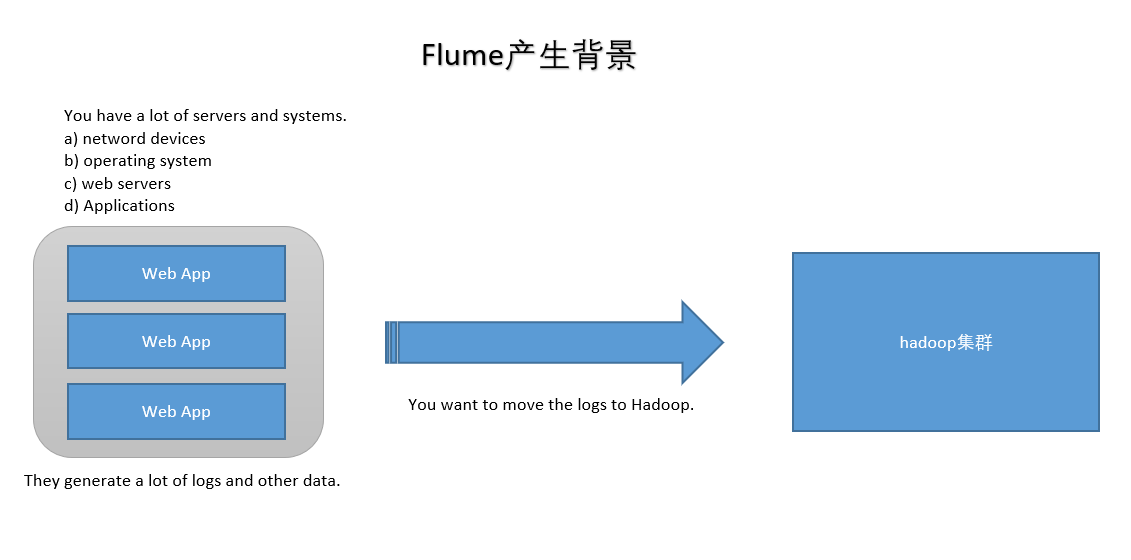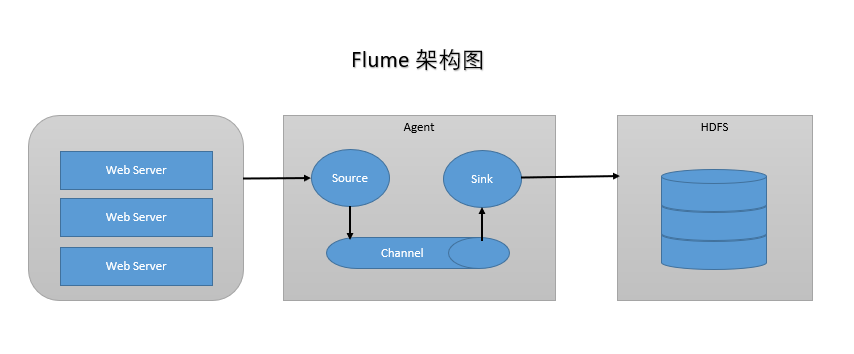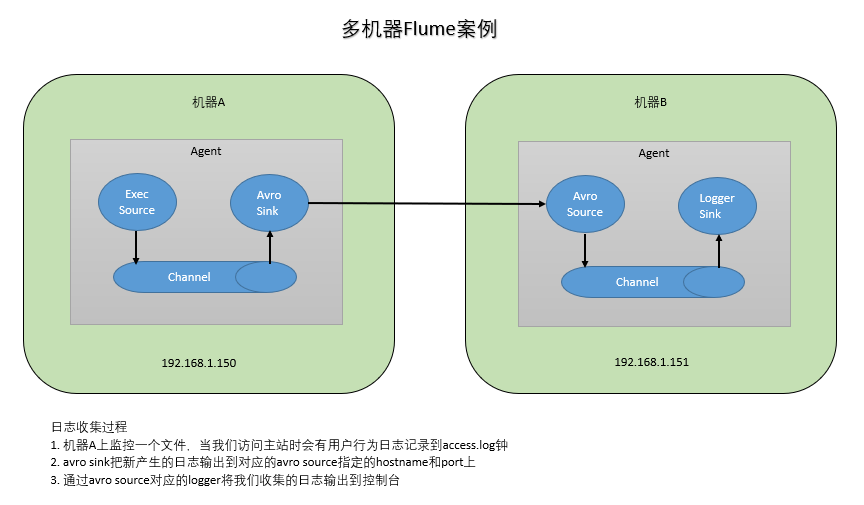分布式日志收集框架Flume
分布式日志收集框架Flume
1.业务现状分析

WebServer/ApplicationServer分散在各个机器上
想在大数据平台Hadoop进行统计分析
日志如何收集到Hadoop平台上
解决方案及存在的问题
如何解决我们的数据从其他的server上移动到Hadoop之上?
- shell: cp --> Hadoop集群的机器上,hdfs dfs -put ....(有很多问题不好解决,容错、负载均衡、时效性、压缩)
- Flume,从 A --> B 移动日志
2.Flume概述
- Flume官网:http://flume.apache.org/
Flume is a distributed, reliable, and available service for efficiently collecting, aggregating, and moving large amounts of log data.
Flume是由Apache基金会提供的一个分布式、高可靠、高可用的服务,用于分布式的海量日志的高效收集、聚合、移动系统。
Flume设计目标
- 可靠性:高科要
- 扩展性:模块可扩展
- 管理性:agent管理
界同类产品对比
- Flume: Cloudera/Apache, Java语言开发。
- Logstash: ELK(ElasticsSearch, Logstash, Kibana)
- Scribe: Facebook, 使用C/C++开发, 负载均衡不是很好, 已经不维护了。
- Chukwa: Yahoo/Apache, 使用Java语言开发, 负载均衡不是很好, 已经不维护了。
- Fluentd: 和Flume类似, Ruby开发。
Flume发展史
- Cloudera公司提出0.9.2,叫Flume-OG
- 2011年Flume-728编号,重要里程碑(Flume-NG),贡献给Apache社区
- 2012年7月 1.0版本
- 2015年5月 1.6版本
- ~ 1.7版本
3.Flume架构及核心组件

Flume有三大组件
- Source: 收集,指定数据源从哪里来(Avro, Thrift, Spooling, Kafka, Exec)
- Channel: 聚集,把数据先存在(Memory, File, Kafka等用的比较多)
- Sink: 把数据写到某个地方去(HDFS, Hive, Logger, Avro, Thrift, File, ES, HBase, Kafka等)
4.Flume环境部署
- 前置条件
- Java Runtime Environment - Java 1.8 or later(安装Java)
- Memory - Sufficient memory for configurations used by sources, channels or sinks(足够内存)
- Disk Space - Sufficient disk space for configurations used by channels or sinks(足够空间)
- Directory Permissions - Read/Write permissions for directories used by agent(读写权限)
- 1.安装JDK(下载,解压,安装,配置环境变量)
- 2.安装Flume(下载,加压,安装,配置环境变量,检测:flume-ng version)
5.Flume实战
需求1:从指定网络端口采集数据输出到控制台
- flume-conf.properties
- A) 配置Source
- B) 配置Channel
- C) 配置Sink
- D) 把以上三个组件串起来
# example.conf: A single-node Flume configuration # a1: agent名称
# r1:source的名称
# k1:sink的名称
# c1:channel的名称 # Name the components on this agent
a1.sources = r1
a1.sinks = k1
a1.channels = c1 # Describe/configure the source
a1.sources.r1.type = netcat
a1.sources.r1.bind = localhost
a1.sources.r1.port = 44444 # Describe the sink
a1.sinks.k1.type = logger # Use a channel which buffers events in memory
a1.channels.c1.type = memory
a1.channels.c1.capacity = 1000
a1.channels.c1.transactionCapacity = 100 # Bind the source and sink to the channel
a1.sources.r1.channels = c1
a1.sinks.k1.channel = c1
- 启动Agent
flume-ng agent \
--name $agent_name \
--conf conf \
--conf-file conf/flume-conf.properties \
-Dflume.root.logger=INFO,console flume-ng agent \
--name a1 \
--conf $FLUME_HOME/conf \
--conf-file $FLUME_HOME/conf/example.conf \
-Dflume.root.logger=INFO,console
- flume-conf.properties
需求2:监控一个文件实时采集新增的数据输出到控制台
- 1.Agent选型:exec source + memory channel + logger sink
- 2.配置文件
# exec-memory-logger.conf: A single-node Flume configuration # a1: agent名称
# r1:source的名称
# k1:sink的名称
# c1:channel的名称 # Name the components on this agent
a1.sources = r1
a1.sinks = k1
a1.channels = c1 # Describe/configure the source
a1.sources.r1.type = exec
a1.sources.r1.command = tail -F /home/k.o/data/data.log
a1.sources.r1.shell = /bin/sh -c # Describe the sink
a1.sinks.k1.type = logger # Use a channel which buffers events in memory
a1.channels.c1.type = memory
a1.channels.c1.capacity = 1000
a1.channels.c1.transactionCapacity = 100 # Bind the source and sink to the channel
a1.sources.r1.channels = c1
a1.sinks.k1.channel = c1
- 启动Agent
flume-ng agent \
--name $agent_name \
--conf conf \
--conf-file conf/flume-conf.properties \
-Dflume.root.logger=INFO,console flume-ng agent \
--name a1 \
--conf $FLUME_HOME/conf \
--conf-file $FLUME_HOME/conf/exec-memory-logger.conf \
-Dflume.root.logger=INFO,console
需求3:将A服务器上的日志实时采集到B服务器

- 技术选型:
1.exec source + memory channel + avro sink
2.arro source + memory channel + logger sink
# exec-memory-avro.conf: A single-node Flume configuration
# exec-memory-avro: agent名称
# exec-source:source的名称
# avro-sink:sink的名称
# memory-channel:channel的名称
# Name the components on this agent
exec-memory-avro.sources = exec-source
exec-memory-avro.sinks = avro-sink
exec-memory-avro.channels = memory-channel
# Describe/configure the source
exec-memory-avro.sources.exec-source.type = exec
exec-memory-avro.sources.exec-source.command = tail -F /home/k.o/data/data.log
exec-memory-avro.sources.exec-source.shell = /bin/sh -c
# Describe the sink
exec-memory-avro.sinks.avro-sink.type = avro
exec-memory-avro.sinks.avro-sink.hostname = localhost
exec-memory-avro.sinks.avro-sink.port = 44444
# Use a channel which buffers events in memory
exec-memory-avro.channels.memory-channel.type = memory
exec-memory-avro.channels.memory-channel.capacity = 1000
exec-memory-avro.channels.memory-channel.transactionCapacity = 100
# Bind the source and sink to the channel
exec-memory-avro.sources.exec-source.channels = memory-channel
exec-memory-avro.sinks.avro-sink.channel = memory-channel
# avro-memory-logger.conf: A single-node Flume configuration
# avro-memory-logger: agent名称
# exec-source:source的名称
# logger-sink:sink的名称
# memory-channel:channel的名称
# Name the components on this agent
avro-memory-logger.sources = avro-source
avro-memory-logger.sinks = logger-sink
avro-memory-logger.channels = memory-channel
# Describe/configure the source
avro-memory-logger.sources.avro-source.type = avro
avro-memory-logger.sources.avro-source.bind = localhost
avro-memory-logger.sources.avro-source.port = 44444
# Describe the sink
avro-memory-logger.sinks.logger-sink.type = logger
# Use a channel which buffers events in memory
avro-memory-logger.channels.memory-channel.type = memory
avro-memory-logger.channels.memory-channel.capacity = 1000
avro-memory-logger.channels.memory-channel.transactionCapacity = 100
# Bind the source and sink to the channel
avro-memory-logger.sources.avro-source.channels = memory-channel
avro-memory-logger.sinks.logger-sink.channel = memory-channel
- 启动Agent
# 先启动 avro-memory-logger
flume-ng agent \
--name avro-memory-logger \
--conf $FLUME_HOME/conf \
--conf-file $FLUME_HOME/conf/avro-memory-logger.conf \
-Dflume.root.logger=INFO,console
# 再启动 exec-memory-avro
flume-ng agent \
--name exec-memory-avro \
--conf $FLUME_HOME/conf \
--conf-file $FLUME_HOME/conf/exec-memory-avro.conf \
-Dflume.root.logger=INFO,console
- 日志收集过程
- 机器A上监控一个文件,当我们访问主站时会有用户行为日志记录到access.log钟
- avro sink把新产生的日志输出到对应的avro source指定的hostname和port上
- 通过avro source对应的logger将我们收集的日志输出到控制台
分布式日志收集框架Flume的更多相关文章
- 学习笔记:分布式日志收集框架Flume
业务现状分析 WebServer/ApplicationServer分散在各个机器上,想在大数据平台hadoop上进行统计分析,就需要先把日志收集到hadoop平台上. 思考:如何解决我们的数据从其他 ...
- 在.NET Core中使用Exceptionless分布式日志收集框架
一.Exceptionless简介 Exceptionless 是一个开源的实时的日志收集框架,它可以应用在基于 ASP.NET,ASP.NET Core,Web Api,Web Forms,WPF, ...
- 分布式日志收集系统 —— Flume
一.Flume简介 Apache Flume 是一个分布式,高可用的数据收集系统.它可以从不同的数据源收集数据,经过聚合后发送到存储系统中,通常用于日志数据的收集.Flume 分为 NG 和 OG ( ...
- 日志收集框架flume的安装及简单使用
flume介绍 Flume是一个分布式.可靠.和高可用的海量日志采集.聚合和传输的系统. Flume可以采集文件,socket数据包等各种形式源数据,又可以将采集到的数据输出到HDFS.hbase.h ...
- 分布式日志收集之Logstash 笔记(一)
(一)logstash是什么? logstash是一种分布式日志收集框架,开发语言是JRuby,当然是为了与Java平台对接,不过与Ruby语法兼容良好,非常简洁强大,经常与ElasticSearch ...
- 分布式日志收集收集系统:Flume(转)
Flume是一个分布式.可靠.和高可用的海量日志采集.聚合和传输的系统.支持在系统中定制各类数据发送方,用于收集数据:同时,Flume提供对数据进行简单处理,并写到各种数据接受方(可定制)的能力.Fl ...
- 分布式日志收集系统Apache Flume的设计详细介绍
问题导读: 1.Flume传输的数据的基本单位是是什么? 2.Event是什么,流向是怎么样的? 3.Source:完成对日志数据的收集,分成什么打入Channel中? 4.Channel的作用是什么 ...
- asp.Net Core免费开源分布式异常日志收集框架Exceptionless安装配置以及简单使用图文教程
最近在学习张善友老师的NanoFabric 框架的时了解到Exceptionless : https://exceptionless.com/ !因此学习了一下这个开源框架!下面对Exceptionl ...
- C#实现多级子目录Zip压缩解压实例 NET4.6下的UTC时间转换 [译]ASP.NET Core Web API 中使用Oracle数据库和Dapper看这篇就够了 asp.Net Core免费开源分布式异常日志收集框架Exceptionless安装配置以及简单使用图文教程 asp.net core异步进行新增操作并且需要判断某些字段是否重复的三种解决方案 .NET Core开发日志
C#实现多级子目录Zip压缩解压实例 参考 https://blog.csdn.net/lki_suidongdong/article/details/20942977 重点: 实现多级子目录的压缩, ...
随机推荐
- EXCHANGE 2013 队列
每当咱在Exchange里查看队列的时候,我们会看到队列分成好几个组,每个邮箱数据库都有自己的目标队列,DAG.AD站点也是,AD林也是一个队列,最后最多的就是外部SMTP域队列. 当传输服务处理队列 ...
- 新特性之MAPI over HTTP \ 配置 MAPI over HTTP
Exchange 2016 中的 MAPI over HTTP https://docs.microsoft.com/zh-cn/Exchange/clients/mapi-over-http/map ...
- 沉淀再出发:ElasticSearch的中文分词器ik
沉淀再出发:ElasticSearch的中文分词器ik 一.前言 为什么要在elasticsearch中要使用ik这样的中文分词呢,那是因为es提供的分词是英文分词,对于中文的分词就做的非常不好了 ...
- 为Linux设置IPTables防火墙
我们 来讨论一下如何为你的CentOS 服务器来设置简单的防火墙. 这里我们以DigitalOcean的CentOS 6 VPS为基础来讨论的,同样也适用于 阿里云上其他类型的LINUX系统. (阿里 ...
- Linux下中间人攻击利用框架bettercap测试
0x01简介 bettercap可用来实现各种中间人攻击,模块化,便携.易扩展 0x02特点 提到中间人攻击,最知名的莫过于ettercap,而开发bettercap的目的不是为了追赶它,而是替代它 ...
- java多态实例
学校有两个打印机,一个彩印,一个黑白印,都打印输出 public class printerDemo { public static void main(String[] args) { colorP ...
- MySQL存储过程-遍历游标的例子
delimiter $$DROP PROCEDURE IF EXISTS pro_test ;CREATE PROCEDURE pro_test()begin DECLARE var_name var ...
- jq实现简单的滑动解锁效果
<!DOCTYPE html> <html> <head lang="en"> <meta charset="UTF-8&quo ...
- python不用正则过渡括号
- 在Windows 10中更改网络连接优先级
查看接口列表 (也可使用 如下) 选择网络连接,然后单击右侧的箭头以更改网络连接优先级. 可以参考之前的部分 链接在此 更改单个wi-fi连接顺序可以使用如下
